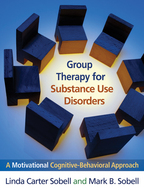Group Therapy for Substance Use Disorders
A Motivational Cognitive-Behavioral Approach
Linda Carter Sobell and Mark B. Sobell
“This book gives details of the guided self-change (GSC) model. The model has been proven by the authors in clinical application....It is clear throughout that the book has been written by skilled and experienced practitioners, with clients' needs at the forefront....The book will appeal to practitioners at all levels who are looking to help the change process in a range of settings.”
—Drugs and Alcohol Today
“Adds much to the field of substance abuse and evidence-based group work....A vibrant and useful text that effectively blends the philosophy of MI with practical examples on how to build a working group based on its principals. Richly peppered with tables and handouts....The book's primer on MI may be useful in many areas of mental health treatment....The authors' ability to blend helpful practice illustrations and principles makes this a text that provides a thoughtful and conceptually based roadmap for group work with the substance-abusing population. The authors' nonjudgmental approach to change makes what they present useful in a variety of group settings beyond those focused on substance abuse....Practitioners working with myriad substance-abusing populations will benefit from this workbook....Although this text seems geared toward adult clients, it can easily be modified for work with adolescents and young adults....With its attention to detail, useful clinical examples and handouts and strong foundation in theory, Group Therapy for Substance Use Disorders: A Motivational Cognitive Behavioral Approach delivers an introduction on addictions, MI and group work for students and beginning practitioners, as well as a useful manual for practiced therapists looking for an organized "how-to" for integrating a new model of change.”
—Social Work with Groups
“A useful guide to group therapy and offers constructive ideas about individual therapy as well. The inclusion of many assessment measures, handouts, informational sheets, and homework assignments makes this a useful reference for therapists who are involved in treating substance use disorders.”
—PsycCRITIQUES
“Comprehensive and up to date, this book presents essential tools for addressing one of the most prevalent and disabling mental health problems. While a group treatment format has advantages over individual treatment, it is also associated with a number of clinical challenges. These challenges are clearly and effectively addressed by the authors. This invaluable resource is destined to become required reading for mental health care providers who want to further develop their clinical skills.”
—Stefan G. Hofmann, PhD, Department of Psychology, Boston University
“The Sobells are preeminent in the addiction treatment field. This engaging book presents the evidence behind their innovative group treatment approach and synthesizes decades of research and clinical experience. Readers will find a wealth of clinical examples, practical advice, handouts, and tools to measure client progress. The Sobells show how leading a group is like conducting an orchestra, and provide wise insights into 'making the music come from the group.'”
—Mary Marden Velasquez, PhD, Director, Health Behavior Research and Training Institute, University of Texas at Austin
“Group therapy is a standard treatment for substance use disorders, but there is limited guidance for group therapists committed to providing empirically supported treatments. The Sobells fill that gap with this book, which provides a beautiful blend of science and clinical wisdom; great handouts for clients; clear instructions for therapists; and meaningful clinical examples. The authors share their experience and thoughts in a way that invites both therapists-in-training and experienced therapists to use their approach. This book is a gem.”
—Barbara S. McCrady, PhD, Distinguished Professor of Psychology and Director, Center on Alcoholism, Substance Abuse, and Addictions, University of New Mexico
Table of Contents
I. Rationale, Research, and Assessment1. Guided Self-Change Treatment and Its Successful Extension to Group Therapy
2. Overview of Motivational Interviewing Strategies and Techniques
3. Assessment: A Running Start for Treatment
II. Guided Self-Change: A Motivational Cognitive-Behavioral Intervention for Individual and Group Therapy
4. Guided Self-Change Treatment in an Individual Format
5. Integrating Motivational Interviewing and Cognitive-Behavioral Techniques into Group Therapy
III. Conducting and Managing Groups: Pregroup Planning, Group Cohesion, and Difficult Situations and Clients
6. Building Group Cohesion: Music Comes from the Group
7. Managing Groups: Structural Issues
8. Managing Difficult Clients in Groups
9. The Way Ahead
Appendices
A. AUDIT Questionnaire
B. Drug use Questionnaire (DAST-10)
C. Drug Use History Questionnaire
D. Brief Situational Confidence Questionnaire (BSCQ)
About the Authors
Linda Carter Sobell, PhD, ABPP, is Professor and Associate Director of Clinical Training at the Center for Psychological Studies at Nova Southeastern University, where she is Codirector (with Mark B. Sobell) of the Guided Self-Change Clinic. She has collaborated with Mark B. Sobell on research and hundreds of publications focusing on brief motivational interventions, the process of self-change, and the Timeline Followback assessment method. Each is a recipient of numerous awards for their contributions to the field of addictions, including the Distinguished Scientific Contribution Award from the Society of Clinical Psychology, Division 12 of the American Psychological Association; the Charles C. Shepard Science Award from the Centers for Disease Control and Prevention and the Agency for Toxic Substances and Disease Registry; and the Lifetime Achievement Award from the Addictions Special Interest Group of the Association for Behavioral and Cognitive Therapies.Mark B. Sobell, PhD, ABPP, is Professor at the Center for Psychological Studies at Nova Southeastern University, where he is Codirector (with Linda Carter Sobell) of the Guided Self-Change Clinic. He has collaborated with Linda Carter Sobell on research and hundreds of publications focusing on brief motivational interventions, the process of self-change, and the Timeline Followback assessment method. Each is a recipient of numerous awards for their contributions to the field of addictions, including the Distinguished Scientific Contribution Award from the Society of Clinical Psychology, Division 12 of the American Psychological Association; the Charles C. Shepard Science Award from the Centers for Disease Control and Prevention and the Agency for Toxic Substances and Disease Registry; and the Lifetime Achievement Award from the Addictions Special Interest Group of the Association for Behavioral and Cognitive Therapies.
